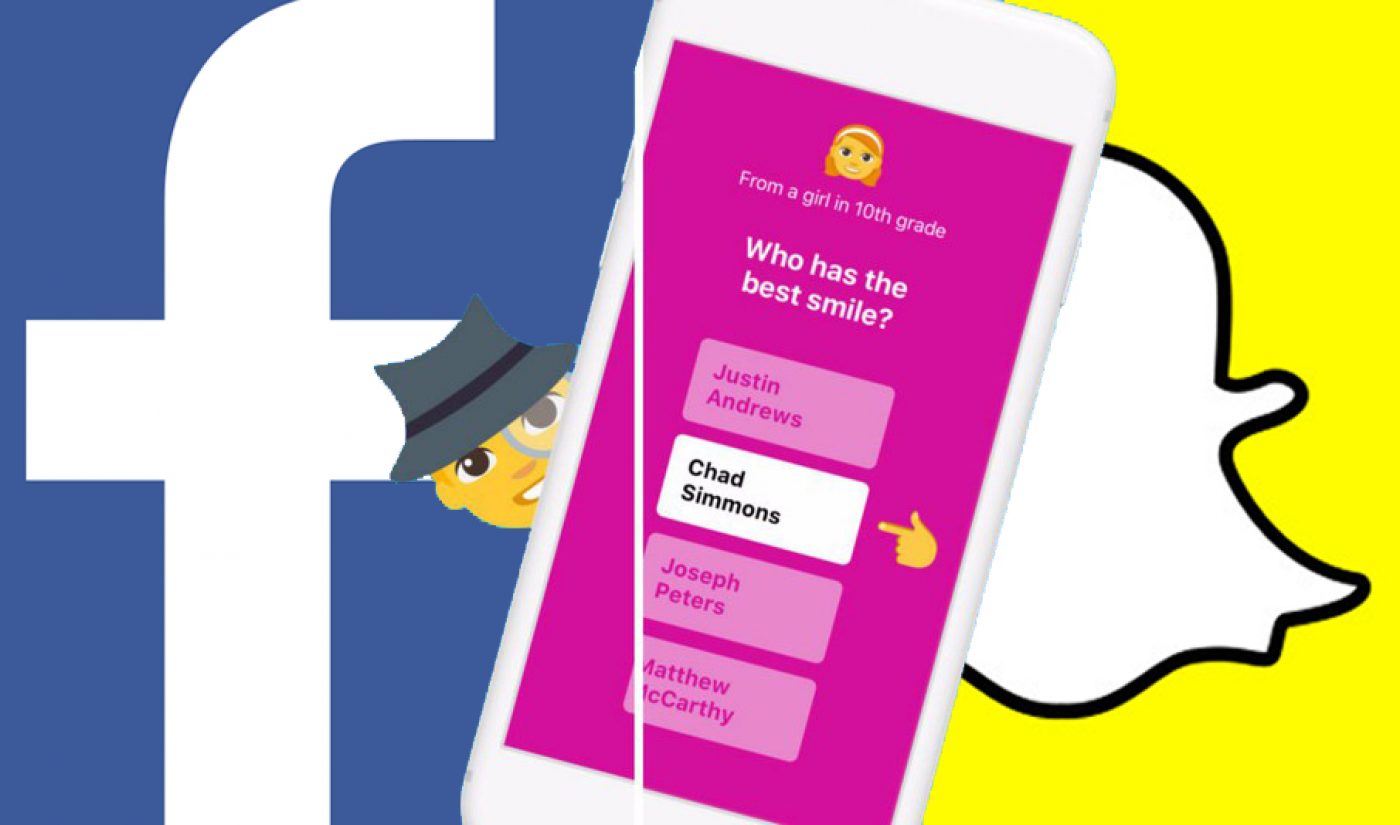Insights is a weekly series featuring entertainment industry veteran David Bloom. It represents an experiment of sorts in digital-age journalism and audience engagement with a focus on the intersection of entertainment and technology, an area that David has written about and thought about and been part of in various career incarnations for much of the past 25 years. David welcomes your thoughts, perspectives, calumnies, and kudos at david@tubefilter.com, or on Twitter @DavidBloom.
For a small acquisition by a very big company, Facebook’s scooping up of the newborn app tbh sure manifested a lot of justifiable unhappiness in certain knowledgeable circles.
It also provided a nice, tight spotlight on a huge question: What companies will be the platforms of choice for Generation Z, the kids who are the successors to the Millennials who have dominated culture and conversation the past 15 years? And will Facebook let any of these platforms survive outside Facebook’s suffocating embrace?

Subscribe for daily Tubefilter Top Stories
Please don’t overlook what happens with Gen Z. Studies estimate the generation at around 80 million people, roughly a quarter of the US population. The group is going to matter a lot for a long while in American culture and technology, and already commands huge buying power and influence.
But don’t feel bad if you haven’t heard of tbh. To Be Honest ( the basis of the internet acronym that spawned the app’s name), the company barely had time to register on pop culture radars before Facebook swooped in. It only launched in August, and on a limited basis at that.
Then tbh quickly piled up more than 1 billion anonymous poll answers to esteem-building questions such as what friend is “best to bring to a party” or which one’s “perseverance is admirable.”
In the past two months, the app had been downloaded 5 million times, and is used 2.5 million times a day. A remarkable start, and delightful that it’s providing an empowering antidote to online trolling and bullying. There are good reasons Gen Z kids have jumped on it.
The deal’s terms weren’t announced, but Ben Thompson of Stratechery suggested that it probably was just a hair below the $80.8 million price that would automatically trigger a federal regulatory review.
More importantly, he suggested that even though the deal won’t be automatically reviewed, regulators should not just review it, but block it. He’s right, especially given Facebook’s crappy recent history, and the realities of monopoly power in the era of the online network.
To review, Facebook’s modus operandi in recent years has been: If You Can’t Beat ‘Em, Buy ‘Em. It has routinely offered big money to burgeoning, potentially threatening sites early in their development. That approach brought What’s App, Instagram, and Oculus into the fold. It did not, however, bring Snapchat, despite Facebook’s reported $3 billion offer.
When Snap said no, Facebook went to Part B of its playbook: Copy ‘Em Until You Kill ‘Em. Instagram, then What’s App, then Facebook have all copied, down to the names, key parts of Snapchat’s interface in hopes of stemming any outflow of users to the new kid.
The copying has worked to some extent. Snapchat’s user growth has slowed substantially. Wall Street analysts (many of whom can’t grok Snapchat’s sometimes bewildering interface) have suggested that Snapchat and its parent, Snap, are therefore doomed.
But maybe not.
Look at the numbers on Snapchat usage by the 173 million people who are there. They’re on Snapchat a lot, 20 times a day, and for far longer than nearly any other app. Along the way, Snapchat has turned its audience into the world’s heaviest users of augmented reality, which they’ve been doing since 2015.
Piper Jaffray’s latest study showed that, between the spring of last year and fall of this year, Snapchat nearly doubled its pre-eminence as teens’ favorite app, going from 24% to 47%. Instagram was virtually unchanged in that period, at 23% 24%. Facebook fell from 15% to 9%.
In other words, if Snap can hold on in the face of Facebook’s assault, it’s building a powerful inside position with teens. It could actually be a successful independent social-media powerhouse that doesn’t depend on Facebook to thrive.
There are lots of reasons to criticize Snapchat and CEO Evan Spiegel (and I have, going back to their IPO). And it still has a hard road ahead, one that won’t get easier if the feds wave on the tbh deal. But people are starting to notice that it’s time to put the brakes on Facebook‘s acquisitive nature.
Wired, for instance, suggested that Facebook’s Buy or Copy playbook is killing innovation, to everyone’s detriment. It asked “Is Facebook Killing Future Facebooks?” The answer, of course, is yes. Facebook likes it that way. In fact, it’s killing future Facebooks with a vicious alacrity that John D. Rockefeller would, in his Standard Oil days, have found bracing.
Yes, tbh almost certainly would thrive in the Facebook ecosystem, tapping the social graph there to better connect its users to more of their friends, and ultimately become a powerful new engine of advertising revenue, too. At the same time, its privileged position in the Facebook ecosystem would make it very difficult for outsider apps to compete.
If the deal goes through, Facebook will lock in another corner of the social-media ecosystem at a time when it already has broad power, vast revenues, and a poor history of living up to the trust it’s been given.
Promising newcomers such as Snap and tbh need the chance to grow and thrive (or not) without the death grip embrace of an incumbent giant. To be honest, it’s the only way we’re going to keep building an Internet culture that grows and thrives and evolves for all of us, not just for the enrichment of Facebook’s investors.








